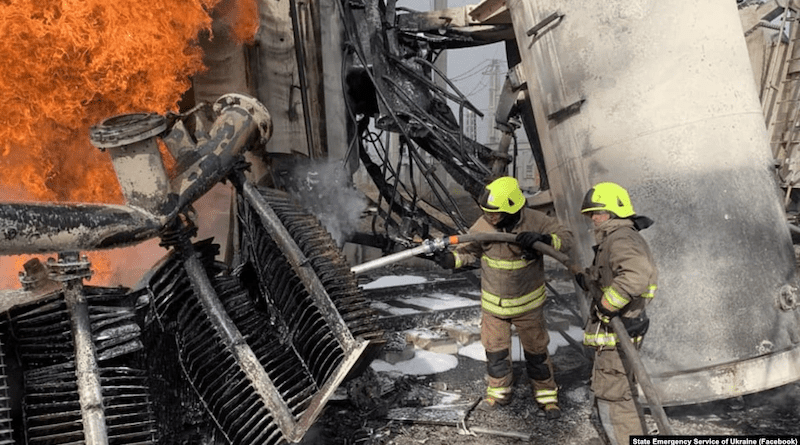‘Wide-Scale’ Russian Attacks Target Ukraine’s Energy Grid, Leaving Millions Without Electricity
By RFE RL
(RFE/RL) — Russia has launched new, “wide scale” missile strikes on Ukraine’s civilian energy sites, causing power outages nationwide, Ukrainian President Volodymyr Zelenskiy said in his regular video address late on October 22.
Moscow says its forces continued to launch attacks against Ukraine’s energy and military infrastructure over the last 24 hours.
Ukrainian authorities say nearly 1.5 million households across the country have been left without electricity.
But Zelenskiy said most of the Russian missiles and drones were being shot down, reiterating an earlier statement by the Ukrainian military that it had downed 18 out of 33 cruise missiles launched from the air and sea on October 22.
“Of course we don’t yet have the technical ability to knock down 100 percent of the Russian missiles and strike drones. I am sure that, gradually, we will achieve that, with help from our partners,” Zelenskiy said.
Russia has intensified its strikes on Ukraine’s power stations, water supply systems, and other key infrastructure over the past two weeks.
The areas targeted by the latest strikes include Khmelnytskiy and Lutsk in the country’s west and the central city of Uman.
Khmelnytskiy, which was home to some 275,000 people before the war, was left with no electricity, shortly after local media reported several loud explosions on October 22, regional officials said.
Uman, which had some 100,000 residents before the war, was also plunged into darkness after a rocket hit a nearby power station.
In Lutsk, a city of 215,000, electricity had been partially knocked out after Russian missiles slammed into local energy facilities, according to local officials.
Authorities in Khmelnytskiy and Lutsk urged residents to store water, “in case it’s also gone.”
Air strikes and power disruptions were also reported from Odesa in the south, the central city of Dnipro, and Zaporizhzhya in the country’s southeast.
The national energy company, Ukrenerho, continued to urge all Ukrainians to conserve energy.
In his address later on October 22, Zelenskiy said authorities had managed to restore power in multiple regions where electricity had been cut off as a result of the attack.
“The main target of the terrorists is energy,” he said.
In the capital, Kyiv, and surrounding regions rolling blackouts came into effect on October 22 in response to the reduced power supplies.
Ukrainian officials said about 40 percent of the country’s electric power system has been severely damaged since Russia increased attacks on Ukraine’s civilian infrastructure.
Zelenskiy had earlier said 30 percent of Ukraine’s power stations have been destroyed by Russian strikes since October 10.
Prime Minister Denys Shmyhal warned that the intensifying missile and drone strikes will create a new wave of refugees from Ukraine.
“If there is no more electricity, no more heating, no more water in Ukraine, this can trigger a new migration tsunami,” he told the October 23 edition of Germany’s broadsheet Frankfurter Allgemeine Zeitung.
Russia’s Defense Ministry said on October 23 that it destroyed a large ammunition depot in Ukraine’s central Cherkasy region that according to the ministry was storing over 100,000 tons of aviation fuel for the Ukrainian Air Force.
The ministry also said in a daily briefing that Russian forces had repelled Ukrainian counteroffensives along the frontlines in southern and eastern Ukraine.
The claims cannot be independently verified.
Russian Defense Minister Sergei Shoigu said Moscow had concerns Ukraine could use a “dirty bomb” in the conflict, without providing evidence to support his suggestion.
Shoigu made the comment during a phone conversation with his French counterpart, Sebastien Lecornu, on October 23, according to Russian news agencies.
Shoigu was quoted as saying that the situation in Ukraine was rapidly deteriorating and trending toward “uncontrolled escalation.”

